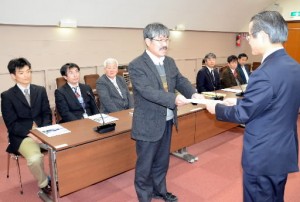Association of second-generation A-bomb survivors seeks thorough analysis of genetic effects of A-bombings by RERF
Feb. 24, 2015
by Michiko Tanaka, Staff Writer
On February 17, the National Association of Second-generation A-bomb Survivors submitted a written request to the Radiation Effects Research Foundation (RERF), asking that RERF pursue more detailed analysis of their data to better determine if the A-bomb experiences of their parents have had any genetic influence. RERF has been studying the health of second-generation A-bomb survivors.
Through a medical check-up, conducted once every four years, RERF is investigating whether second-generation A-bomb survivors show any symptoms of disease and the possible correlation between their health conditions and their parents’ level of exposure to A-bomb radiation. From 2002 to 2006, they gathered data on 12,000 people and concluded that “there is no causal relationship.” From 2010 to 2014, RERF again gathered data, this time on about 10,000 people, most of whom had undertaken the previous check-up. That data is now being analyzed.
The request made by the association of second-generation survivors consists of eight items, such as a focus on analyzing the data involving those who were born within five years of the atomic bombings, a survey on mortality rates in line with the parents’ level of radiation exposure, and continuing guidance on health matters. Eight members of the group, including Noboru Sakiyama, the vice president, visited RERF and handed the document to Takanobu Teramoto, the executive director of RERF. RERF indicated that they would later respond.
Katsuhiro Hirano, the secretary general of the association, said, “The results of the last analysis gave the government a rationale for not providing support to second-generation A-bomb survivors. However, with many second-generation survivors still concerned about their health, we would like RERF to carry out a thorough investigation.”
(Originally published on February 18, 2015)
On February 17, the National Association of Second-generation A-bomb Survivors submitted a written request to the Radiation Effects Research Foundation (RERF), asking that RERF pursue more detailed analysis of their data to better determine if the A-bomb experiences of their parents have had any genetic influence. RERF has been studying the health of second-generation A-bomb survivors.
Through a medical check-up, conducted once every four years, RERF is investigating whether second-generation A-bomb survivors show any symptoms of disease and the possible correlation between their health conditions and their parents’ level of exposure to A-bomb radiation. From 2002 to 2006, they gathered data on 12,000 people and concluded that “there is no causal relationship.” From 2010 to 2014, RERF again gathered data, this time on about 10,000 people, most of whom had undertaken the previous check-up. That data is now being analyzed.
The request made by the association of second-generation survivors consists of eight items, such as a focus on analyzing the data involving those who were born within five years of the atomic bombings, a survey on mortality rates in line with the parents’ level of radiation exposure, and continuing guidance on health matters. Eight members of the group, including Noboru Sakiyama, the vice president, visited RERF and handed the document to Takanobu Teramoto, the executive director of RERF. RERF indicated that they would later respond.
Katsuhiro Hirano, the secretary general of the association, said, “The results of the last analysis gave the government a rationale for not providing support to second-generation A-bomb survivors. However, with many second-generation survivors still concerned about their health, we would like RERF to carry out a thorough investigation.”
(Originally published on February 18, 2015)








